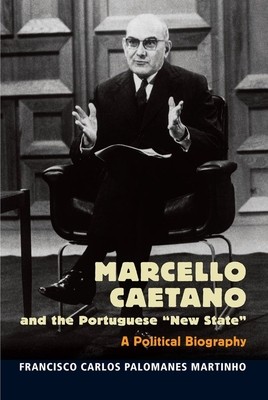
- We will send in 10–14 business days.
- Author: Francisco Martinho
- Publisher: Liverpool University Press
- ISBN-10: 1789760097
- ISBN-13: 9781789760095
- Format: 15.4 x 23.4 x 1.9 cm, softcover
- Language: English
- SAVE -10% with code: EXTRA
Reviews
Description
Prime Minister Marcello Caetano was the successor of António de Oliveira Salazar. Considered the second most important figure of the Portuguese dictatorship (the Estado Novo regime, 1933-1974), Caetano has generated considerable disagreement amongst scholars with regard to his persona and politics; some consider him more authoritarian than his predecessor, others more liberal. After providing background on his childhood and entry to university, the author explains his growing activism in the Integralismo Lusitano and in the Catholic Church; his monarchist and nationalist ideology. Caetano's decision to support the Salazar Regime coincided with publications in the mainstream media on corporatism, colonialism, European politics and the relationship between Brazil and Portugal. His role in the office of General Secretary of Mocidade Portuguesa (MP), an organization of Portuguese youth similar to the fascist youth organizations in Italy or Germany, was at odds with his neutrality
policy in the Second
EXTRA 10 % discount with code: EXTRA
The promotion ends in 17d.19:27:44
The discount code is valid when purchasing from 10 €. Discounts do not stack.
- Author: Francisco Martinho
- Publisher: Liverpool University Press
- ISBN-10: 1789760097
- ISBN-13: 9781789760095
- Format: 15.4 x 23.4 x 1.9 cm, softcover
- Language: English English
Prime Minister Marcello Caetano was the successor of António de Oliveira Salazar. Considered the second most important figure of the Portuguese dictatorship (the Estado Novo regime, 1933-1974), Caetano has generated considerable disagreement amongst scholars with regard to his persona and politics; some consider him more authoritarian than his predecessor, others more liberal. After providing background on his childhood and entry to university, the author explains his growing activism in the Integralismo Lusitano and in the Catholic Church; his monarchist and nationalist ideology. Caetano's decision to support the Salazar Regime coincided with publications in the mainstream media on corporatism, colonialism, European politics and the relationship between Brazil and Portugal. His role in the office of General Secretary of Mocidade Portuguesa (MP), an organization of Portuguese youth similar to the fascist youth organizations in Italy or Germany, was at odds with his neutrality
policy in the Second


Reviews